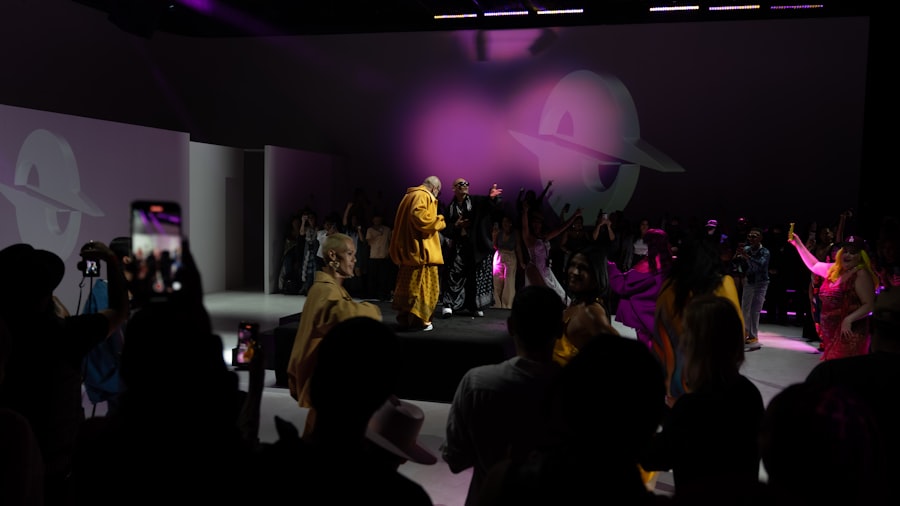Artificial Intelligence (AI) has been making waves in the fashion industry, revolutionizing the way designers create and produce their collections. With the help of AI, fashion designers are able to streamline their design process, from concept to production, and even predict future trends. AI has the ability to analyze vast amounts of data, such as social media trends, consumer behavior, and historical fashion data, to provide designers with valuable insights and predictions.
This allows designers to create more targeted and relevant collections that resonate with their target audience. Furthermore, AI has also been instrumental in improving the sustainability of fashion design. By using AI-powered algorithms, designers are able to optimize their production processes, reduce waste, and minimize their environmental impact.
This has led to a shift towards more sustainable and ethical fashion practices, as designers are able to make more informed decisions about materials, production methods, and supply chain management. Overall, AI has had a profound impact on fashion design, enabling designers to create more innovative, sustainable, and consumer-centric collections.
Key Takeaways
- AI is revolutionizing the creative process in fashion by providing designers with advanced tools for pattern recognition, trend forecasting, and personalized design recommendations.
- The integration of AI in fashion design processes is streamlining production, reducing waste, and improving sustainability by optimizing supply chains and manufacturing processes.
- AI's impact on fashion design is evident in the development of virtual fitting rooms, personalized styling recommendations, and the creation of unique, customized designs based on individual preferences and body measurements.
- The role of artificial intelligence in the fashion industry is expanding to include the use of algorithms and machine learning to analyze consumer behavior, predict trends, and optimize inventory management and pricing strategies.
- AI's influence on fashion trends and styles is shaping the industry by enabling designers to experiment with new materials, textures, and silhouettes, and by providing consumers with personalized, on-demand fashion experiences.
The Role of Artificial Intelligence in the Fashion Industry
In the fashion industry, AI has played a crucial role in transforming the way brands interact with consumers. Through the use of AI-powered chatbots and virtual stylists, brands are able to provide personalized shopping experiences for their customers. These AI-driven tools can analyze customer data and preferences to offer tailored product recommendations and styling advice, ultimately enhancing the overall shopping experience.
Additionally, AI has also been used to improve the efficiency of supply chain management and inventory forecasting. By analyzing historical sales data and market trends, AI can help brands optimize their inventory levels and reduce excess stock, leading to cost savings and improved sustainability. Moreover, AI has also been utilized in the realm of virtual fashion design.
With the use of AI-powered design tools, designers are able to create digital prototypes and simulations, allowing them to experiment with different styles, patterns, and materials without the need for physical samples. This not only speeds up the design process but also reduces waste and production costs. Overall, AI has become an integral part of the fashion industry, driving innovation, efficiency, and sustainability.
The Future of Fashion Design with AI
Looking ahead, the future of fashion design with AI looks promising. As technology continues to advance, AI is expected to play an even larger role in shaping the fashion industry. One area where AI is expected to make significant strides is in the realm of personalized fashion.
With the help of AI algorithms, brands will be able to offer truly personalized products and experiences for their customers, from customized clothing designs to personalized styling recommendations. This level of personalization has the potential to revolutionize the way consumers interact with fashion, leading to a more inclusive and diverse industry. Additionally, AI is also expected to drive further advancements in sustainability within the fashion industry.
By leveraging AI-powered tools for material sourcing, production optimization, and supply chain management, brands will be able to reduce their environmental impact and improve their overall sustainability practices. This will not only benefit the planet but also appeal to an increasingly eco-conscious consumer base. Overall, the future of fashion design with AI holds great promise for driving innovation, sustainability, and personalization within the industry.
AI's Influence on Fashion Trends and Styles
| Impact of AI on Fashion Design | Details |
|---|---|
| Design Process | AI streamlines design process by generating new patterns and designs. |
| Personalization | AI enables personalized recommendations and custom designs based on customer preferences. |
| Sustainability | AI helps in creating sustainable fashion by optimizing material usage and reducing waste. |
| Retail Experience | AI enhances retail experience through virtual try-ons and personalized styling suggestions. |
| Forecasting Trends | AI analyzes data to predict fashion trends and consumer behavior. |
AI has had a profound influence on fashion trends and styles, shaping the way designers create and consumers engage with fashion. Through the analysis of vast amounts of data, including social media trends, consumer behavior, and historical fashion data, AI has the ability to predict future trends and styles with a high degree of accuracy. This has enabled designers to create collections that are more in tune with consumer preferences and market demands.
Additionally, AI has also been used to identify emerging trends and niche markets that may have been overlooked by traditional trend forecasting methods. Furthermore, AI has also played a role in diversifying fashion trends and styles. By analyzing a wide range of cultural influences and consumer preferences, AI has helped designers create more inclusive and diverse collections that resonate with a global audience.
This has led to a shift towards more inclusive representation in fashion, as designers are able to cater to a wider range of body types, cultural backgrounds, and personal styles. Overall, AI's influence on fashion trends and styles has led to a more diverse, inclusive, and consumer-centric industry.
Advancements in Fashion Technology and AI

In recent years, there have been significant advancements in fashion technology and AI that have transformed the way designers create and produce their collections. One notable advancement is the use of 3D modeling and virtual prototyping powered by AI algorithms. This technology allows designers to create digital prototypes of their designs, enabling them to experiment with different styles, patterns, and materials without the need for physical samples.
This not only speeds up the design process but also reduces waste and production costs. Additionally, advancements in AI have also led to the development of virtual stylists and personalized shopping experiences for consumers. Through the use of AI-powered chatbots and virtual stylists, brands are able to offer personalized product recommendations and styling advice based on individual customer preferences.
This level of personalization has transformed the way consumers engage with fashion, leading to more tailored and relevant shopping experiences. Overall, advancements in fashion technology and AI have paved the way for a more efficient, sustainable, and consumer-centric fashion industry.
How AI is Revolutionizing the Creative Process in Fashion
AI has revolutionized the creative process in fashion by providing designers with valuable insights and tools that streamline their design process and enhance their creativity. Through the use of AI-powered algorithms, designers are able to analyze vast amounts of data to gain insights into consumer preferences, market trends, and historical fashion data. This allows designers to make more informed decisions about their designs, ultimately leading to more targeted and relevant collections.
Furthermore, AI has also been instrumental in enhancing the efficiency of the design process. With the use of AI-powered design tools, designers are able to create digital prototypes and simulations, allowing them to experiment with different styles, patterns, and materials without the need for physical samples. This not only speeds up the design process but also reduces waste and production costs.
Additionally, AI has also been used to automate repetitive tasks such as pattern-making and sizing adjustments, freeing up designers' time to focus on more creative aspects of their work. Overall, AI has revolutionized the creative process in fashion by providing designers with valuable insights, tools, and efficiencies that enhance their creativity and innovation.
The Integration of AI in Fashion Design Processes
The integration of AI in fashion design processes has transformed the way designers create and produce their collections. One area where AI has been integrated is in trend forecasting and market analysis. By analyzing vast amounts of data such as social media trends, consumer behavior, and historical fashion data, AI can provide designers with valuable insights into future trends and market demands.
This allows designers to create collections that are more in tune with consumer preferences and market demands. Additionally, AI has also been integrated into virtual prototyping and 3D modeling tools that allow designers to create digital prototypes of their designs. This technology enables designers to experiment with different styles, patterns, and materials without the need for physical samples, ultimately speeding up the design process and reducing waste.
Furthermore, AI has also been integrated into personalized shopping experiences for consumers through the use of chatbots and virtual stylists that offer tailored product recommendations and styling advice based on individual customer preferences. Overall, the integration of AI in fashion design processes has led to more efficient, sustainable, and consumer-centric collections. In conclusion, it is clear that AI is changing fashion design forever by revolutionizing the way designers create and produce their collections.
From streamlining the design process to predicting future trends and enhancing sustainability practices, AI has become an integral part of the fashion industry. As technology continues to advance, we can expect even greater advancements in personalized fashion experiences, sustainability practices, and creative processes driven by AI. The future of fashion design with AI holds great promise for driving innovation, sustainability, and personalization within the industry.

